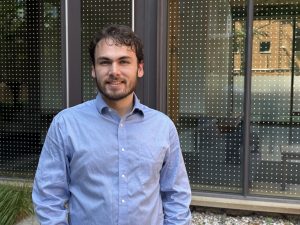
Do electric vehicle tax incentives result in lower carbon emissions or employment stability in the auto sector? How can the transition to clean, sustainable energy be best managed? How can governments best direct their resources to enforcing anti-deforestation laws? These are just some of the research questions economics researchers at the University of Toronto are exploring as urgent global attention focuses on climate change.
Starting in their first year, undergraduate students enrolled in ECO199 can start exploring the trade offs between economic development and environmental degradation at the local level, as seen through soil degradation and deforestation, and at the global level through climate change, and examine the policies meant to address them. More senior undergraduates can access ECO313, Environmental Economics and Policies, and ECO314, Energy and the Environment, where they learn to incorporate aspects of climate economics, energy economics, urban economics, behavioural economics and other areas of the field into their work.
If knowledge is power, the demand for courses in environmental economics among undergraduates should come as no surprise. According to Galway and Field, 56% of the Canadians between 16 and 25 they surveyed “reported feeling afraid, sad, anxious, and powerless” concerning the effects of climate change and the future.

Growth in the field is both necessary and exciting. When Assistant Professor Jeffrey Sun joined the Department of Economics in 2024, it was to become part of a research and teaching community at the fore of environmental economics.
“You can almost see a new kind of structural climate economics taking shape here, and I could not be more excited to be a part of it,” Professor Sun said upon joining the Department of Economics.
Learning about environmental issues using economic models is challenging students to re-think how fundamental concepts of the discipline function in the world. Graduates are taking that new understanding into every aspect of the workforce.
“One of the lessons I learned from Jeffrey Sun in the Environmental Economics course is that free markets work, when we hold key assumptions, but if we don’t have those assumptions, then the free market is not going to give us what we want,” said recent alumna Jessica Schwalb.
Specialists in the topic working at UofT range from veteran scholars like Adonis Yatchew, an energy economist, who won the International Association of Energy Economics award for Outstanding Contributions to the Profession in 2018, to UTM-based deforestation expert Eduardo Souza-Rodrigues to Christoph Semken, one of the department’s most recent hires whose recent research uses methods and models of environmental, behavioural and applied economics.

As a leader in the field, UofT hosted the inaugural Toronto Meeting on the Economics of Climate Change (TMEC) at the end of June. The event itself serves as an example of how diverse environmental economics is. Organized by faculty members Sun and Semken, along with Professor Stephan Heblich, the meeting brought together diverse climate change researchers from across fields. The meeting was global in scope and attracted international researchers working at institutions across North America and Italy.
“What stood out to me about the inaugural TMEC was the breadth of research presented, said Semken. “The lively discussions with presenters, policymakers, faculty, and students will undoubtedly inspire new research ideas and solutions to the climate crisis.”
Semken’s thoughts about the meeting were broadly shared.

The keynote speaker, Mar Reguant, is an ICREA Researcher at IAE-CSIC and Professor of Economics at Northwestern University. She opened the meeting with a presentation entitled Challenges and Successes in Renewable Integration that painted a picture of how existing and evolving energy grids are using solar, wind and hydro power to ensure a stable and reliable electricity supply.
“I very much enjoyed the first edition of TMEC,” said Professor Reguant. “I had the opportunity to interact with many researchers working on climate change with ambitious research agendas, which left me inspired after the sessions. I appreciated the breadth of topics and methodologies while keeping the common theme about how to tackle this crisis.”

Meredith Fowlie, who opened the second day of the meeting, is a professor with the Department of Agricultural and Resource Economics at UC Berkeley and serves as faculty director of the Energy Institute at Haas and as co-director of the Environment and Energy Program at the National Bureau of Economic Research. Her presentation of her recent working paper, How Are Insurance Markets Adapting to Climate Change? Risk Classification and Pricing in the Market for Homeowners Insurance, examined how insurers are changing their pricing and classification models as the risk of severe weather and climate events increases for property owners.
“This was an inspiring forum for presenting research and building the partnerships we need to drive real-world impact,” Fowlie said of the meeting.
The range of presentations and fields represented at the three-day long event was intended from its inception. In keeping with its inclusive nature, it was hosted at both Econ HQ, Max Gluskin House on the St. George campus, and at UTM. The event was co-sponsored by Department of Economics, the School of Environment and Climate Positive Energy with the support of the UTM Sustainability Research Fund, the Office of the Vice-Principal Research and Innovation, and the Rotman School of Management.
“We managed to bring together people who work on the economics of climate change at every level, from global integrated assessment modelling to figuring out how to frame and implement carbon pricing programs in Canada,” said Sun. “In so doing, we managed to have a conversation whose comprehensiveness and practicality is unmatched, not just in Canada but globally. It’s exactly the sort of thing we need to be able to tackle this crisis with expertise and perspective.”
Return to the Department of Economics website.
Scroll more news.
